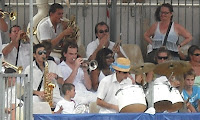Which brings me to The 346th Annual Water Jousting Festival in Sète.
This five day aquatic party has been going for nigh on three hundred and fifty years and shows no real signs of having changed much since 1666. Basically, boys and men ten years old and upwards and with seemingly no height, weight or agility restrictions practise all year, then on the given date clamber atop boats fitted with a tintaine (a fitted wooden gangplank) and sail at each other armed with wooden shields and steel tipped jousts, the aim being to poke and topple your opponent into the water who then has to endure the 'swim of shame'. There is a blue team (traditionally single men) vs. a red team (the married men). The loss of a working body part / eye / dignity is seen as integral to the proceedings - all part of 'bigging up' as a Man.

 Righty ho, let the games begin, and what fun it was too! We relished once again the total lack of police presence, gleefully noting that St. John's Ambulance or equivalent were missing entirely, revelled in the large bars lining the streets freely selling wine, pastis and beer for 1 euro a go, appreciated the band playing frantically, observed with interest the teenagers inking each other with marker pens and laughing uproariously every time a known associate humiliated himself. Any man, woman or child could have fallen into the water at any moment as there were no barriers and I sincerely doubt a great deal of thought had been given to public liability insurance. All of which makes for a great laissez faire atmosphere!
Righty ho, let the games begin, and what fun it was too! We relished once again the total lack of police presence, gleefully noting that St. John's Ambulance or equivalent were missing entirely, revelled in the large bars lining the streets freely selling wine, pastis and beer for 1 euro a go, appreciated the band playing frantically, observed with interest the teenagers inking each other with marker pens and laughing uproariously every time a known associate humiliated himself. Any man, woman or child could have fallen into the water at any moment as there were no barriers and I sincerely doubt a great deal of thought had been given to public liability insurance. All of which makes for a great laissez faire atmosphere!  It was especially interesting to watch the boys clambering up the gangplanks of boats and setting sail on a direct collision course, wearing outfits basically unchanged for about a hundred years, armed with a steel tipped pole and protected by a small wooden shield. I couldn't help thinking that in many other countries - certainly in Australia - participants would now be wearing life jackets and protective helmets at the very least, brandishing full length body shields made of kevlar, their poles probably replaced by something akin to a pool noodle. Not in Sète. If they want to joust, this is how it's done and competitors enter at their own risk. Another "PC" thought - is this encouraging aggression and violence in youth or channelling human nature to a celebrated outlet with historic and cultural significance? I incline rather towards the latter - especially when rival reds and blues are all gathered together after the event enjoying churros and galettes alongside the older competitors indulging in the 1 euro vin. Very typical, very historic, very French, very good!
It was especially interesting to watch the boys clambering up the gangplanks of boats and setting sail on a direct collision course, wearing outfits basically unchanged for about a hundred years, armed with a steel tipped pole and protected by a small wooden shield. I couldn't help thinking that in many other countries - certainly in Australia - participants would now be wearing life jackets and protective helmets at the very least, brandishing full length body shields made of kevlar, their poles probably replaced by something akin to a pool noodle. Not in Sète. If they want to joust, this is how it's done and competitors enter at their own risk. Another "PC" thought - is this encouraging aggression and violence in youth or channelling human nature to a celebrated outlet with historic and cultural significance? I incline rather towards the latter - especially when rival reds and blues are all gathered together after the event enjoying churros and galettes alongside the older competitors indulging in the 1 euro vin. Very typical, very historic, very French, very good!


No comments:
Post a Comment